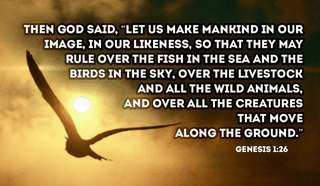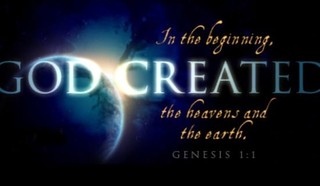- Recent Translations
- All Translations
Genesis 1:2
Share
Settings
Genesis 1:2 in Other Translations
Genesis 1:2 Meaning and Commentary
And the earth was without form, and void
It was not in the form it now is, otherwise it must have a form, as all matter has; it was a fluid matter, the watery parts were not separated from the earthy ones; it was not put into the form of a terraqueous globe it is now, the sea apart, and the earth by itself, but were mixed and blended together; it was, as both the Targums of Jonathan and Jerusalem paraphrase it, a waste and desert, empty and destitute of both men and beasts; and it may be added, of fishes and fowls, and also of trees, herbs, and plants. It was, as Ovid F11 calls it, a chaos and an indigested mass of matter; and Hesiod F12 makes a chaos first to exist, and then the wide extended earth, and so Orpheus F13, and others; and this is agreeably to the notion of various nations. The Chinese make a chaos to be the beginning of all things, out of which the immaterial being (God) made all things that consist of matter, which they distinguish into parts they call Yin and Yang, the one signifying hidden or imperfect, the other open or perfect F14: and so the Egyptians, according to Diodorus Siculus {o}, whose opinion he is supposed to give, thought the system of the universe had but one form; the heaven and earth, and the nature of them, being mixed and blended together, until by degrees they separated and obtained the form they now have: and the Phoenicians, as Sanchoniatho F16 relates, supposed the principle of the universe to be a dark and windy air, or the blast of a dark air, and a turbid chaos surrounded with darkness, as follows;
and darkness was upon the face of the deep:
the whole fluid mass of earth and water mixed together. This abyss is explained by waters in the next clause, which seem to be uppermost; and this was all a dark turbid chaos, as before expressed, without any light or motion, till an agitation was made by the Spirit, as is next observed:
and the Spirit of God moved upon the face of the waters,
which covered the earth, ( Psalms 104:6 ) the earthy particles being heaviest sunk lower, and the waters being lighter rose up above the others: hence Thales F17 the philosopher makes water to be the beginning of all things, as do the Indian Brahmans F18: and Aristotle F19 himself owns that this was the most ancient opinion concerning the origin of the universe, and observes, that it was not only the opinion of Thales, but of those that were the most remote from the then present generation in which he lived, and of those that first wrote on divine things; and it is frequent in Hesiod and Homer to make Oceanus, or the ocean, with Tethys, to be the parents of generation: and so the Scriptures represent the original earth as standing out of the water, and consisting of it, ( 2 Peter 3:5 ) and upon the surface of these waters, before they were drained off the earth, "the Spirit of God moved"; which is to be understood not of a wind, as Onkelos, Aben Ezra, and many Jewish writers, as well as Christians, interpret it; since the air, which the wind is a motion of, was not made until the second day. The Targums of Jonathan and Jerusalem call it the spirit of mercies; and by it is meant the Spirit of the Messiah, as many Jewish writers F20 call him; that is, the third Person in the blessed Trinity, who was concerned in the creation of all things, as in the garnishing of the heavens, so in bringing the confused matter of the earth and water into form and order; see ( Job 26:13 ) ( Psalms 104:30 ) ( Psalms 33:6 ) . This same Spirit "moved" or brooded F21 upon the face of the waters, to impregnate them, as an hen upon eggs to hatch them, so he to separate the parts which were mixed together, and give them a quickening virtue to produce living creatures in them. This sense and idea of the word are finely expressed by our poet F23. Some traces of this appear in the (nouv) or mind of Anaxagoras, which when all things were mixed together came and set them in order F24; and the "mens" of Thales he calls God, which formed all things out of water F25; and the "spiritus intus alit" of Virgil; and with this agrees what Hermes says, that there was an infinite darkness in the abyss or deep, and water, and a small intelligent spirit, endued with a divine power, were in the chaos F26: and perhaps from hence is the mundane egg, or egg of Orpheus F1: or the firstborn or first laid egg, out of which all things were formed; and which he borrowed from the Egyptians and Phoenicians, and they perhaps from the Jews, and which was reckoned by them a resemblance of the world. The Egyptians had a deity they called Cneph, out of whose mouth went forth an egg, which they interpreted of the world F2: and the Zophasemin of the Phoenicians, which were heavenly birds, were, according to Sanchoniatho F3, of the form of an egg; and in the rites of Bacchus they worshipped an egg, as being an image of the world, as Macrobius
F4 says; and therefore he thought the question, whether an hen or an egg was oldest, was of some moment, and deserved consideration: and the Chinese say F5, that the first man was produced out of the chaos as from an egg, the shell of which formed the heavens, the white the air, and the yolk the earth; and to this incubation of the spirit, or wind, as some would have it, is owing the windy egg of Aristophanes F6.
(Thomas Chamlers (1780-1847) in 1814 was the first to purpose that there is a gap between verse 1 and 2. Into this gap he places a pre-Adamic age, about which the scriptures say nothing. Some great catastrophe took place, which left the earth "without form and void" or ruined, in which state it remained for as many years as the geologist required. F7 This speculation has been popularised by the 1917 Scofield Reference Bible. However, the numerous rock layers that are the supposed proof for these ages, were mainly laid down by Noah's flood. In ( Exodus 20:11 ) we read of a literal six day creation. No gaps, not even for one minute, otherwise these would not be six normal days. Also, in ( Romans 5:12 ) we read that death is the result of Adam's sin. Because the rock layers display death on a grand scale, they could not have existed before the fall of Adam. There is no direct evidence that the earth is much older than six thousand years. However, we have the direct eyewitness report of God himself that he made everything in six days. Tracing back through the biblical genealogies we can determine the age of the universe to be about six thousand years with an error of not more than two per cent. See Topic 8756.
Editor.)
F11 "Quem dixere chaos, rudis indigestaque moles", Ovid Metamorph. l. 1. Fab. 1.
F12 (htoi men protista caov) &c. Hesiodi Theogonia.
F13 Orphei Argonautica, ver. 12.
F14 Martin. Sinic. Hist. l. 1. p. 5.
F15 Bibliothec. l. 1. p. 7.
F16 Apud Euseb. Praepar. Evangel. l. 2. c. 10. p. 33.
F17 Laert. in Vita Thaletis, p. 18. Cicero do Natura Deorum, l. 1.
F18 Strabo. Geograph. l. 15. p. 491.
F19 Metaphysic. l. 1. c. 3.
F20 Zohar in Gen. fol. 107. 3. and fol. 128. 3. Bereshit Rabba, fol. 2. 4. and 6. 3. Vajikra Rabba, sect. 14. fol. 156. 4. Baal Hatturim in loc. Caphtor Uperah, fol. 113. 2.
F21 (tpxrm) "incubabat", Junius, Tremellius, Piscator, "as a dove on her young", T. Bab. Chagigah, fol. 15. 1.
F23 ----and, with mighty wings outspread, Dovelike satst brooding on the vast abyss, And mad'st it pregnant.---- Milton's Paradise Lost, B. 1. l. 20, 21, 22. The same sentiment is in B. 7. l. 234, 235.
F24 Laert. in Vita Anaxagor. p. 91. Euseb. Evangel. Praepar. l. 10. c. 14. p. 504.
F25 Cicero de Nat. Deorum, l. 1. Lactant, de falsa Relig. l. 1. c. 5.
F26 Apud Drusium in loc.
F1 Hymn. (protogon) , ver. 1, 2.
F2 Euseb. Praepar. Evangel. l. 3. c. 11. p. 115.
F3 Apud Ib. l. 2. c. 10. p. 33.
F4 Saturnal. l. 7. c. 16.
F5 Martin. Sinic. Hist. l. 1. p. 3, 4.
F6 In Avibus.
F7 Ian Taylor, p. 363, 364, "In the Minds of Men", 1984, TEF Publishing, P.O. Box 5015, Stn. F, Toronto, Canada.
Genesis 1:2 In-Context
Videos for Genesis 1:2
Cross References 5
-
1.
Isaiah 23:1 ;Isaiah 24:10 ;Isaiah 27:10 ;Isaiah 32:14 ;Isaiah 34:11 -
2.
Isaiah 45:18 ;Jeremiah 4:23 -
3.
Genesis 8:2 ;Job 7:12 ;Job 26:8 ;Job 38:9 ;Psalms 36:6 ;Psalms 42:7 ;Psalms 104:6 ;Psalms 107:24 ;Proverbs 30:4 -
4.
Genesis 2:7 ;Job 33:4 ;Psalms 104:30 ;Isaiah 32:15 -
5.
Deuteronomy 32:11 ;Isaiah 31:5




